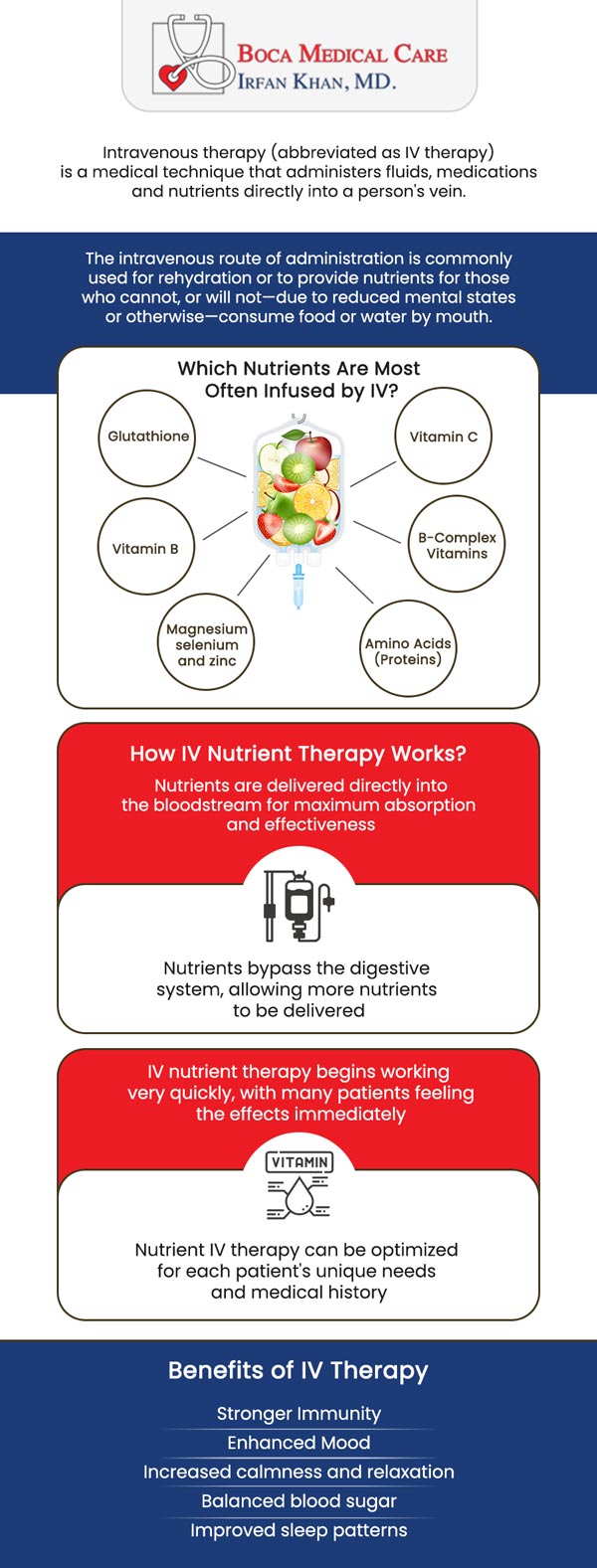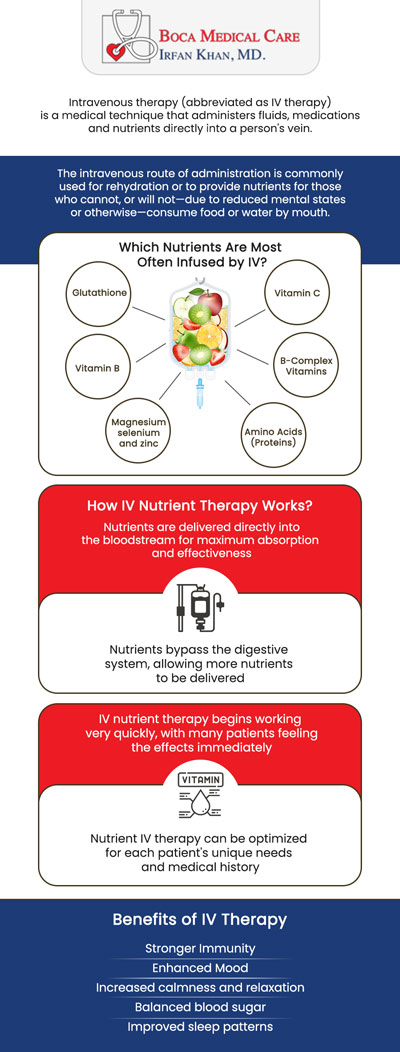How Does an IV Therapy Work?
Intravenous therapy involves delivering fluids, medications, or nutrients directly into a person’s bloodstream via a needle and an IV line. There are various potential benefits of IV therapy, depending on the specific treatment and individual needs. IV therapy is offered by Dr. Irfan Khan at Boca Medical Care in Boca Raton, FL. Contact us today for more information, or book with our specialists at your earliest convenience. Boca Medical Care is conveniently located at 9250 Glades Rd #110 Boca Raton, FL 33434.


Table of Contents:
What is IV therapy used for?
What is the most common type of IV therapy?
How long does it take for IV therapy to kick in?
How do you know if you need IV therapy?
Intravenous (IV) therapy is a treatment that includes the administration of vitamins, fluids, medications, or nutrition straight into a patient’s veins. It is a commonly used medical technique that has numerous applications in modern healthcare. IV therapy is also used for the rapid and efficient delivery of medications, fluids, or nutrients to patients who can’t use oral medications or who require immediate treatment.
In addition to its use in critical care settings, IV therapy is also used to address a variety of medical conditions. For example, it can be used to treat dehydration, electrolyte imbalances, and infections. In cancer treatment, IV therapy can be used to deliver chemotherapy drugs or other medications directly into the bloodstream. The use of IV therapy has also gained popularity in recent years for wellness purposes. Some people use IV therapy to boost energy levels, improve skin health, or for general health and wellness benefits.
IV therapy for wellness purposes is often administered in clinics or spas and may involve the infusion of vitamins, minerals, or other nutrients. IV therapy is known to be a safe and effective medical treatment that has numerous applications in modern healthcare. Its changeable options and efficiency make it an important tool for addressing a wide range of medical conditions and improving patient outcomes.
Saline solution is the most frequently used type of IV therapy, owing to its ability to replenish fluids and electrolytes in patients who are dehydrated or have lost fluids due to injury or illness. It is a sterile solution that contains a mixture of water and sodium chloride, which closely resembles the body’s own fluids. In addition to its use as a hydrating agent, saline solution is also used as a diluent for medications that are administered intravenously. This helps to ensure that the medications are input in a safe and effective manner and that they are not too concentrated for the patient’s bloodstream. Other common types of IV therapy include the administration of medications, blood products, and nutrition. Medications that are commonly administered intravenously include antibiotics, pain medications, and chemotherapy drugs. Blood, red blood cells, platelets, and plasma, can be given intravenously to improve blood clotting or to address blood loss. Parenteral nutrition, which involves the administration of nutrients directly into the bloodstream, may also be given intravenously to patients who have difficulty eating or digesting food normally.
The duration for IV therapy to take effect can vary depending on the type of treatment being used and the individual patient’s condition. In some instances, patients may feel the effects of IV therapy immediately, while in other cases it may take several hours or longer for the treatment to take effect. For example, in cases where IV therapy is being used to address dehydration or electrolyte imbalances, patients may feel better almost immediately as fluids and electrolytes are replenished. Similarly, in cases where IV therapy is being used to administer pain medication or other medications, patients may feel the effects of the medication within minutes of the treatment.
However, in cases where IV therapy is being used to address more complex medical conditions, such as cancer or autoimmune diseases, it may take longer for the treatment to take effect. In these cases, IV therapy is often used as a part of a larger treatment plan that may also include other medications, chemotherapy, or radiation therapy. Ultimately, the length of time it takes for IV therapy to take effect will depend on the specific treatment being administered and the individual patient’s response to the treatment. Your healthcare provider can supply you with more information on what to expect during your IV therapy treatment.
Determining whether or not you need IV therapy depends on a variety of factors and should be evaluated by a medical professional. In general, IV therapy is recommended for patients who can’t tolerate oral medications or who require immediate treatment due to a medical condition. IV therapy may also be recommended if you are undergoing cancer treatment and require chemotherapy or other medications to be administered intravenously. Additionally, if you have any chronic medical condition, like Crohn’s disease or ulcerative colitis, that affects your body’s ability to absorb nutrients from food, you may require IV nutrition to help maintain your health. If you have questions about IV therapy or would like to discuss your options with a specialist, contact us today at Boca Medical Care or book online to schedule an appointment. Visit our clinic in Boca Raton, 9250 Glades Rd #110. We serve patients from Boca Raton FL, Kings Point FL, Delray Beach FL, Deerfield Beach FL, Pompano Beach FL, Highland Beach FL and surrounding areas.
Check Out Our 5 Star Reviews


Additional Services We Offer
▸ Medical Marijuana
▸ Medical Weight Loss
▸ Immigration Physical
▸ Workers Comp
▸ Internal Medicine
▸ Telemedicine Visits
▸ Ozempic Injection
▸ Vaccination
▸ IV Therapy
▸ Semaglutide GLP-1 Injections
▸ Vitamin B12 Shots
▸ Hormone Testing
▸ Joint Pain
▸ BHRT

Additional Services We Offer
▸ Medical Marijuana
▸ Medical Weight Loss
▸ Immigration Physical
▸ Workers Comp
▸ Internal Medicine
▸ Telemedicine Visits
▸ Ozempic Injection
▸ Vaccination
▸ IV Therapy
▸ Semaglutide GLP-1 Injections
▸ Vitamin B12 Shots
▸ Hormone Testing
▸ Joint Pain
▸ BHRT


